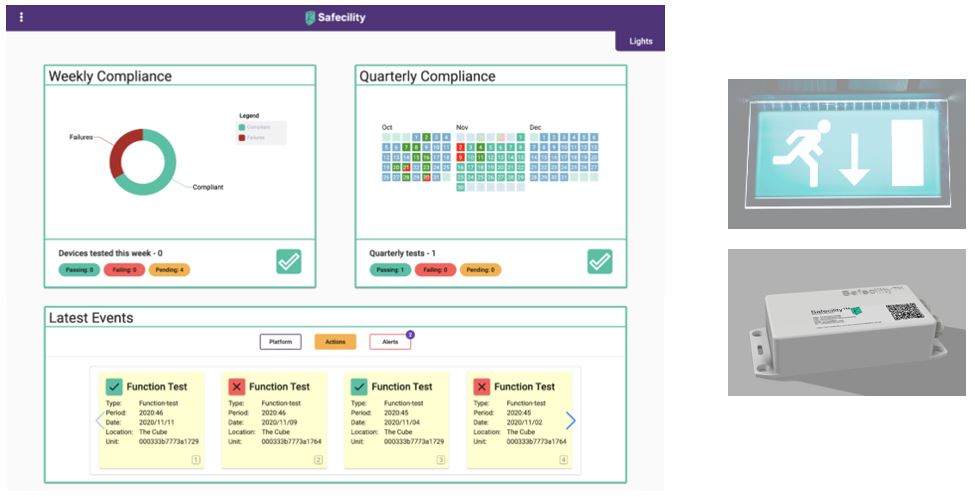Source: Safecility
Between end-2018 and begin 2020, the city and county council of Limerick in Ireland carried out a pre-commercial procurement to improve the liveability of old houses in the Georgian quarter without destroying the typical characteristics of this beautiful historic part of the city. The city was facing the challenge that 40%-60% of the old buildings remained vacant, as they did not meet today’s standards for safe and comfortable residential living spaces. The objective was to find the most cost effective, least damaging and effective innovative solutions to improve fire safety in historical buildings, making them usable again for habitation and contributing to the regeneration of the city core. The project was supported by Enterprise Ireland’s pre-commercial procurement program - called SBIR (Small Business Innovation Research) - that focuses on stimulating innovations in fields where mostly SMEs are active.

Out of all companies that participated in the pre-commercial procurement, Safecility delivered the best value for money solution. Safecility developed a smart wireless automated test system for emergency lighting, a key requirement that building managers need to achieve compliance with fire safety regulations. The solution consists of a hardware and software component. Lightweight sensors are attached to existing emergency lights in buildings. These smart sensors automatically perform duration and function tests on each emergency light daily, weekly and monthly in line with legal requirements and report the data to the Safecility cloud platform to inform the building manager in real-time. The system logs all tests and monitoring results and enables building managers to inspect remotely the status of thousands of sensors across different buildings at the same time.

By replacing manual building inspections with automated building inspection, the solution eliminates the labour cost for fire safety inspections and cuts the costs of regenerating buildings for accommodation by offering remote compliance-as-a-service to owners. The testing at Limerick showed that the solution was able to cut costs by 90%.
The solution was also able to meet Limerick’s special demands to keep the building ‘fabric’ of historical buildings so that they do not lose their character. Indeed, in historic buildings it is often inappropriate or impossible to provide fire doors, fire stops, sprinkler systems, multiple-exit routes and so on, as they would change the look and feel of the building away from its heritage. The newly developed IoT solution does not require placing any additional wiring, gateway or local internet connection in the buildings and on-site installation of the solution takes less than 15 minutes. Testing showed that the solution can examine emergency sensory lighting, fire door sensors and cavity sensors that can be rolled out also in other building projects, helping to reduce re-development costs. The system is also standards and EU certification compliant.
The pre-commercial procurement gave the company a solid foundation upon which it is building further to grow its business. Since the project, the company has grown by 50% in staff and has successfully won contracts with councils in Ireland and in the UK. Several local authorities as well as private building operators have meanwhile adopted the solution.
The pre-commercial procurement also increased Safecility’s investments in new product development. The project opened up significant ongoing R&D work, as it unveiled new bottlenecks and technical hurdles, which the company continues to tackle in the area of blockchain for public safety in buildings and enabling technology for IoT in safe smart buildings. Since then Safecility has continued to invest in bringing new product improvements to the market. The company has added new features to its product portfolio that enable to remotely monitor the water quality or other environmental parameters that determine the living conditions in buildings.
As solutions that improve building safety are useful also for building managers in other EU countries, Safecility has recently also received financial support from the European Space Agency and from the EU, for promising startups in IoT and cyberphysical systems. That could help the company further expand its customer base across Europe. In addition, the company entered into a partnership with ST Microelectronics to work closely on the development of new IoT products for safer buildings.
The Limerick SBIR pre-commercial procurement has been a huge propulsion in our development as a business. It has created awareness of our solution and credibility among other clients. It was one of our earliest projects and other projects on our site have all occurred since then. The pre-commercial procurement offered us the opportunity to work closely with regulators, it showed that our solution outperformed others on the market and it enabled us to deploy early IoT devices with real city clients, which helped commercialise our offer towards other customers. I can warmly recommend companies and public buyers across Europe to start more pre-commercial procurements.
says Cian O’Flaherty, CEO of Convex lens, the mother company of Safecility.
More info: www.safecility.com
